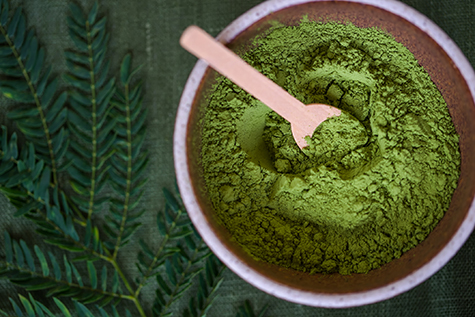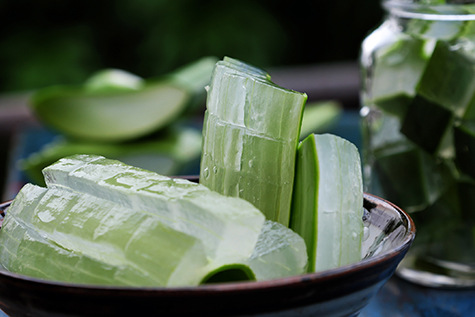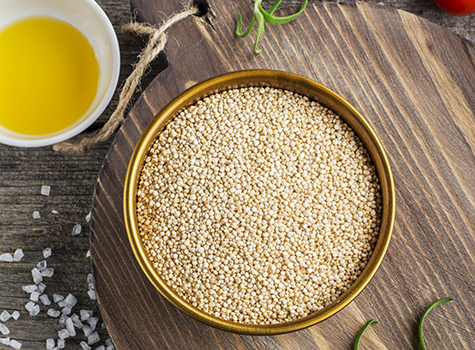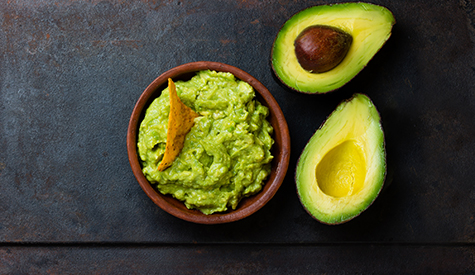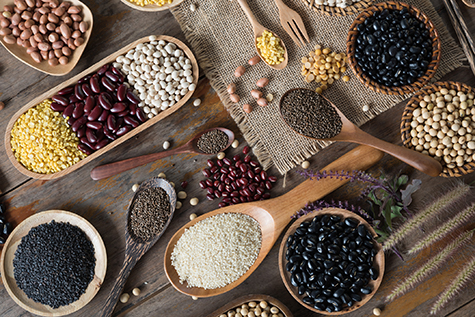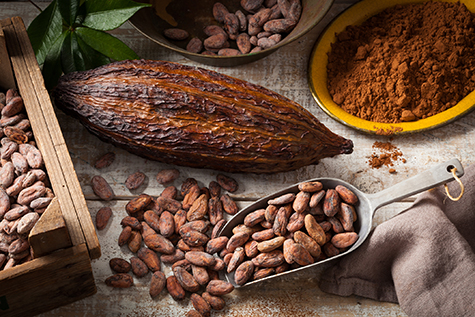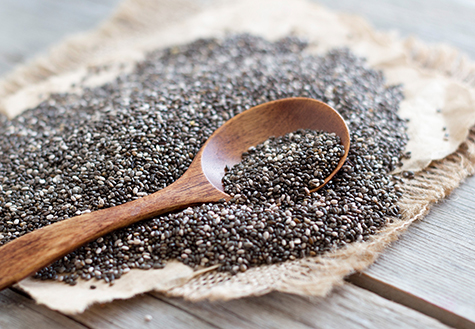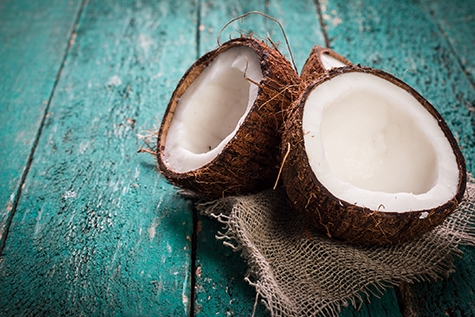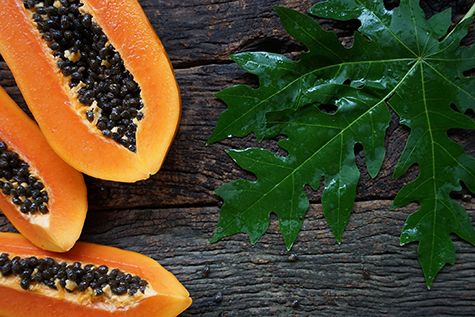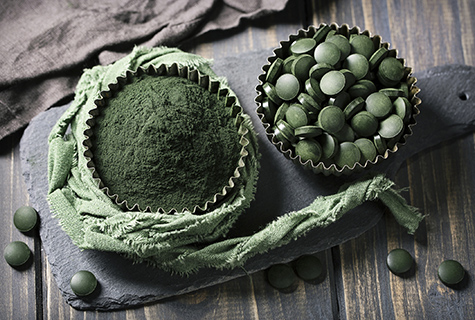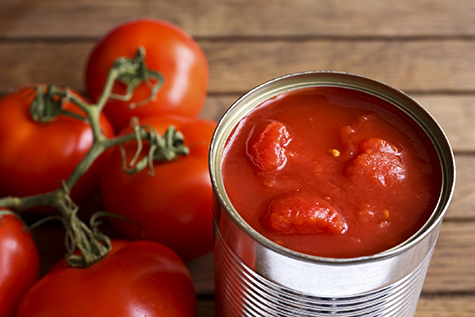Say Gracias! To the Superfoods of Mexico

There are a couple of ways to look at Mexican ‘superfoods’. First, if you eliminate the tortilla chips, full-fat cheese and beans cooked with lard, much of the basics of Mexican cuisine are quite healthy. Beans (cooked, but not refried) and rice, fresh seafood, chicken, lean beef, tomatoes and avocados are all highly nutritious foods that provide plenty of benefits. And many of these foods qualify as ‘superfoods’—nutrient dense and high in healthy fats, fiber, vitamins, minerals and protein.
The other way to look at Mexican superfoods is to seek out indigenous foods that have been staples of the traditional Mexican diet for centuries, but are now being incorporated as healthy additions to the modern Western diet. These include items such as chia, spirulina and cacao beans. Either way, you can enjoy classic Mexican foods that will boost your health and well-being. Here are some of my top picks:
Aloe – A succulent that grows abundantly in subtropical regions of the world including Mexico, aloe is a natural anti-inflammatory. It’s generally used to hydrate skin topically, but you can juice it or slice it up in a salad to ingest its vitamins and minerals, amino acids, and fatty acids.
· Aloe also aids digestion.
· Boosts immunity.
· Improves cardiovascular health.
Amaranth – An ancient grain that has been consumed in Mexico since 4,000 BC, amaranth probably originated in Central or South America. Pete Noll, executive director of the non-profit Bridge to Community Health, which works to foster self-determination in rural Mexican communities says, “We believe it is a superfood. Amaranth’s high protein content and low cost make it especially suited to low-income communities where poor nutrition and obesity are rampant.”
Here are some very good reasons to add amaranth to your menu:
- Studies have shown it to have cancer-preventing, anti-inflammatory and cholesterol-lowering properties.
- It’s relatively high in protein as well as lysine, an amino acid absent in most grains.
- It provides nutritionally significant levels of vitamins C and A.
- Amaranth can be used as a supplemental flour in tortillas, breads, cookies, pasta and marzipan.
Avocado — Yes, avocados are 77% fat, but it’s healthy unsaturated fat that the body uses for slow burning energy and for maintaining moisture and elasticity of the skin. Benefits include:
- They’re loaded with vitamin E and antioxidant carotenoids that help protect skin from the aging effects of the sun.
- They provide 18 essential amino acids necessary for the body to form a complete protein.
- The oleic acid found in avocados helps reduce inflammation.
- A 5 ounce serving of avocado contains 7 grams of fiber, which is 27% of the recommended daily amount. Then there’s the delicious, buttery taste! I have a number of delectable avocado recipes in both of my cookbooks, The Age Gracefully Cookbook and The Age Beautifully Cookbook.
Beans – There’s almost never a Mexican meal without beans. Generally thought of as a low cost, low status food, beans are rich in so many FoodTrient properties. For instance:
- Beans as a regular part of your diet may decrease the risk of diabetes, heart disease and colorectal cancer.
- They’re high in protein, but low in fat and calories.
- Beans have a low glycemic load, which means they help stabilize blood sugar levels. They act as time-released energy for the body.
- They’re high in fiber, which aids the digestive system and creates a feeling of fullness, helping to manage weight.
- Deeply colored red, pinto and black beans are especially rich in antioxidants.
- Beans provide generous amounts of vitamins and minerals including thiamin, riboflavin, niacin, vitamins B6, A, C and K, calcium, iron, magnesium, phosphorus, potassium, folate, manganeseand copper.
Try my delicious Black Bean and Pineapple Salsa recipe.
Cacao – Cultivated by the Mayans and Aztecs, cacao is the bean that is eventually processed with sugar and other ingredients into chocolate. However, it contains plenty of healthy nutrients and benefits including:
- It’s one of the best plant-based sources of magnesium, which is essential for heart health and helps turn energy into brain-fueling glucose.
- It contains 40 times the antioxidants of blueberries.
- Cacao is the highest plant-based source of iron, which is needed to carry oxygen in the bloodstream to cells and tissues. It also contains generous levels of sulphide, which in conjunction with iron strengthens hair, nails and helps detox the liver.
- It contains more bone-building calcium than cow’s milk.
- Cacao boosts endorphins, the mood-elevating hormones, and acts as a natural anti-depressant.
- It’s rich in minerals including zinc, copper, iron calcium, manganese, and potassium.
To spice up chili, try adding an ounce of unsweetened baking chocolate. This recipe for Creamy Vegan Chocolate Mousse just tastes indulgent!
Chia — The Mayans had a word for strength—chia—for good reason. The tiny black seeds of the chia plant contain an easily digestible protein and a good dose of heart-healthy Omega 3 fatty acids. They also reduce cholesterol, help maintain beneficial blood sugar levels and are great for detoxing your whole system just to name a few, but there is more:
- Chia seeds help your body metabolize fat and reduce levels of stress hormones that promote fat storage.
- Chia seeds are an excellent source of protein, providing 18 of 22 amino acids. Just two tablespoons contain over 10% of the daily recommended value of cholesterol-free protein.
- Chia contains eight times as many Omega-3 fatty acids as wild salmon.
- Great source of calcium – a two tablespoon serving provides as much calcium as a half-cup of milk without the fat or lactose.
My nutrition-packed Chia Frescas are my versions of Mexican agua frescas.
Coconut – A true superfood, coconut is high in fiber while low in carb content, which helps increase metabolism. Other important benefits:
- Coconut flour is gluten free.
- A natural sports drink, coconut water contains calcium, potassium and magnesium– essential minerals that are lost through sweating during exercise.
- Once shunned for its saturated fat content, coconut oil contains medium chain triglycerides, which are metabolized differently from other saturated fats—the fat in coconut oil is converted into energy rather than stored as fat.
- The fat in coconut helps the body absorb vitamins A, D, E and K.
- Coconuts boost immunity because they are antibacterial, antiviral and antifungal.
Friends who taste my Sweet Potato and Jackfruit Delight made with coconut milk say they love it.
Papaya – Legend has it that Columbus called papaya, “fruit of the angels.”Besides having a wonderful sweet, musky flavor and gorgeous color, papaya is one of the most nutrient dense and healing foods known. Here’s what papayas can do for you:
- They’re high in beta carotene, vitamins C, A and minerals such as calcium, phosphorus, potassium and iron.
- Papaya and pineapple contain digestive enzymes that help break down protein, making it easier for the body to access.
- They contain anti-viral and anti-inflammatory properties, which can provide relief from autoimmune disorders such as lupus, fibromyalgia, or arthritis.
- A diet with generous amounts of papaya will improve skin, hair, and nails and keep eye’s bright and clear.
- The black seeds inside the papaya are edible and helpful for eliminating parasites from the body.
My Papaya Salsa is great with chicken or fish.
Spirulina – A member of the microalgae family, spirulina was cultivated in Lake Tenochtilán, where Mexico City was established in the 14th century. Like its seaweed cousins, spirulina straddles the plant and animal kingdoms and contain more chlorophyll than any other foods. It also:
- Is a great source of plant-based protein. Ounce per ounce, spirulina has three times the protein of steak.
- Contains a pigment called phycocyanin, which has powerful anti-oxidant properties that one study has shown to inhibit certain cancer cells.
- Reduces cravings, boosts energy and provides vitamins B1 and B2 when you add 14g of organic spirulina to your smoothies.
Tomatoes – Technically a fruit, but used as a vegetable, tomatoes are native to South America and figure prominently in Mexican cuisine. Here’s what they can do for you:
- Tomatoes cooked in oil are especially rich in a carotenoid called lycopene, which is associated with reducing prostate cancer.
- Lycopene also helps protect against lung, stomach and colorectal cancers as well as protecting the heart from oxidative damage that can lead to heart attacks.
- The anti-cancer properties of tomatoes are enhanced when consumed with fat-rich foods such as olive oils and avocados, so enjoy!
- Tomatoes are rich in lutein, which is important for eye health.
This recipe for Tomato Curry Soup may not exactly be Mexican, but it provides plenty of health-boosting FoodTrients.
